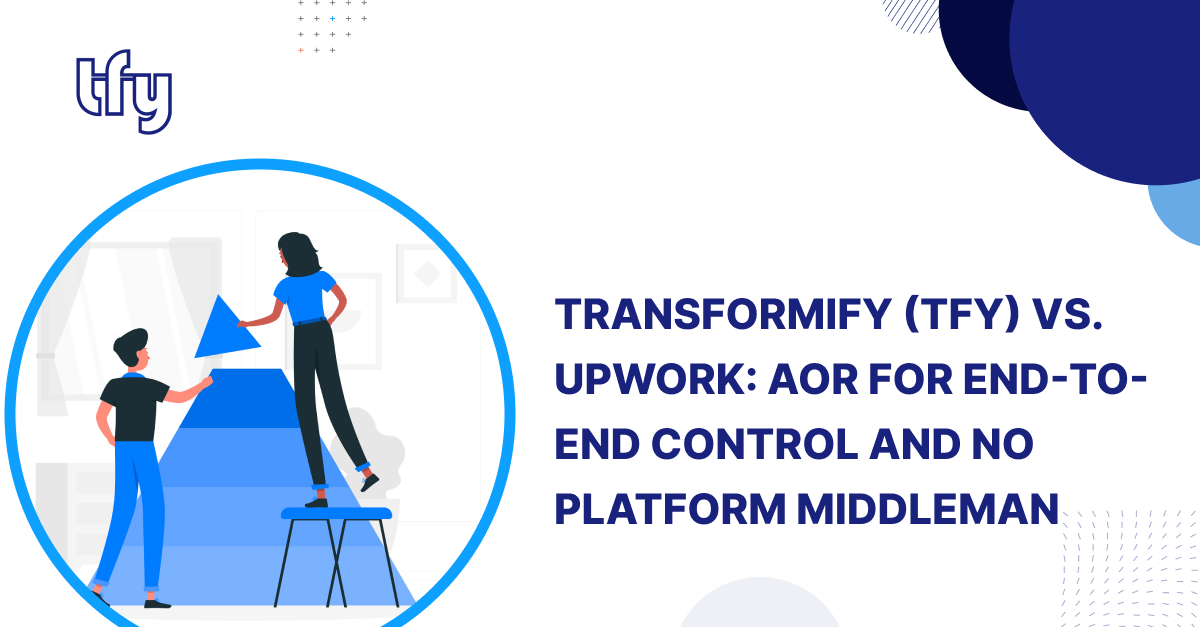
Managing a global contractor workforce today demands efficiency, transparency, and control. Businesses must navigate complex tax laws, diverse payment systems, and compliance obligations — all without losing visibility or margin to intermediaries.
TFY and Upwork both provide solutions for managing international contractors, but their models dmiffer fundamentally. TFY offers Agent of Record (AOR) services with full end-to-end control, while Upwork operates as a marketplace intermediary.
This comparison explores their approaches to AOR (or equivalent solutions), focusing on control, compliance, automation, and platform independence — helping you choose the right system for your global workforce strategy.
Why AOR Matters for Global Contractor Management
An Agent of Record (AOR) acts as a legal intermediary between a company and its international contractors, managing onboarding, payments, and compliance.
This service is vital for organizations hiring globally, as it minimizes risk and administrative complexity.
Key qualities of an effective AOR solution include:
- End-to-End Control: Centralized hiring, compliance, and payment workflows.
- No Platform Middleman: Direct, single-vendor relationships without marketplace commissions.
- Transparent Pricing: Predictable costs with no hidden fees.
- Compliance and Automation: Built-in tools for GDPR, IR35, and labor law adherence.
AOR Overview: TFY vs. Upwork
Feature | TFY (Agent of Record) | Upwork (Marketplace Model) |
| Countries Supported | 184 | 180+ |
| Pricing | £5 per contractor/month + 1.5% on payments | 10% freelancer fee + 3–5% client fee (Marketplace) |
| End-to-End Control | Centralized via Vendor Management System (VMS) | Decentralized, managed per freelancer |
| Middleman Presence | None — TFY is the single vendor | Platform intermediary adds commission |
| Payment Methods | Bank, e-wallets, debit cards, 20+ cryptocurrencies | PayPal, direct deposit, wire transfer |
| Automation | Self-billing, payment scheduling, contractor portal | Time tracking and payment automation |
| Compliance | Full legal compliance (GDPR, IR35) | Basic compliance; client-managed |
| Integrations | APIs for Xero, BambooHR, SAP | Project tool integrations |
| Unique Feature | Cryptocurrency and same-day payments | Global freelancer access and protection |
Deep Dive: Control, Compliance, and Cost Efficiency
1. End-to-End Control
TFY:
TFY provides centralized control through its Vendor Management System (VMS). Businesses can manage onboarding, documents, compliance, invoicing, and payments all in one dashboard. Contractors access a self-serve portal for document uploads and payment tracking, reducing manual oversight.
Upwork:
Upwork’s tools support time tracking and messaging, but management is decentralized. Clients handle each freelancer individually, from contracting to compliance.
For organizations managing large or regulated workforces, this model can become fragmented.
Verdict:
TFY delivers true end-to-end visibility and operational simplicity — ideal for scaling teams across borders.
2. Eliminating the Platform Middleman
TFY:
With TFY, there’s no marketplace intermediary. The platform acts as the sole vendor, issuing invoices directly to businesses and subcontracting to individual contractors. This reduces friction and removes percentage-based commissions.
Upwork:
Upwork charges 10% from freelancers and 3–5% from clients (more on higher-tier plans). While this marketplace model is excellent for sourcing talent, it adds layers between clients and contractors.
Verdict:
TFY’s direct vendor model ensures cost efficiency and stronger client–contractor relationships.
3. Transparent Pricing
TFY:
At £5 per contractor/month plus 1.5% on payments, TFY’s pricing model is predictable and cost-efficient.
No hidden fees, no commissions — just a straightforward structure that scales easily with volume.
Upwork:
Upwork’s tiered commission model adds up quickly.
Freelancers pay up to 10% per project, and clients 3–5%.
The Business Plus plan raises costs further (8–12%), which can significantly impact margins.
Verdict:
TFY provides superior pricing transparency and lower total cost for long-term or high-volume engagements.
4. Global Reach and Payment Options
TFY:
Operates in 184 countries, supporting multiple payment methods including SWIFT, SEPA, ACH, Revolut, Wise, PayPal, Payoneer, Venmo, and 20+ cryptocurrencies.
Same-day payment options enhance speed and satisfaction for contractors worldwide.
Upwork:
Available in over 180 countries, but payment options are limited to traditional methods — no cryptocurrency support, and varying transfer fees per region.
Verdict:
TFY leads in global payment flexibility, especially for companies embracing crypto or multi-currency payouts.
5. Compliance and Automation
TFY:
Built for global compliance. TFY automates contractor classification, GDPR adherence, and IR35 risk mitigationthrough its VMS.
Contractors use self-billing and automated documentation to stay compliant, reducing administrative load for clients.
Upwork:
Provides general contract templates and payment protection, but compliance responsibility largely falls on the client — which may expose businesses to risk in certain jurisdictions.
Verdict:
For organizations requiring strict legal compliance, TFY’s automation-driven AOR model is more robust and reliable.
6. Integration and Customization
TFY:
Integrates seamlessly with HR and accounting systems such as Xero, BambooHR, and SAP through open APIs — enabling real-time synchronization of workforce data and financial workflows.
Upwork:
Offers limited integrations with project tools like Slack and Zoom, but lacks deep HR or payroll system connections.
Verdict:
TFY’s open integrations make it the better fit for businesses that need workforce management embedded into their core systems.
Unique AOR Advantages
TFY stands apart with:
- Cryptocurrency and same-day payments
- Automated self-billing
- Built-in compliance automation
- 184-country coverage
- Centralized dashboard for contractors and admins
Upwork, by contrast, is best for:
- Accessing a large freelance talent pool
- Project-based hiring and short-term engagements
- Simple payment and review mechanisms
Which Platform Wins?
Choose TFY if you want:
- Centralized control through a compliant AOR system
- No marketplace middleman or commissions
- Transparent, predictable pricing
- Crypto-ready, same-day global payments
- Scalable workforce management for 180+ countries
Choose Upwork if you want:
- Quick access to freelancers for ad-hoc projects
- A large global talent marketplace
- Built-in communication and time tracking
Verdict:
For companies seeking true AOR capabilities with global reach, transparent pricing, and direct control, TFY clearly leads.
Its ability to handle compliance, automation, and payments in one platform offers a modern alternative to marketplace-based contractor management.
FAQs
1. What is an Agent of Record (AOR)?
An AOR acts as a legal intermediary between a business and its contractors, ensuring compliance, payment accuracy, and tax alignment across jurisdictions.
2. How does TFY differ from Upwork?
TFY provides a single-vendor AOR model with end-to-end control and no commissions.
Upwork operates as a freelance marketplace where clients and contractors transact through the platform, with associated fees.
3. Why does eliminating the middleman matter?
By removing intermediaries, companies using TFY reduce costs, simplify communication, and maintain direct relationships with their contractors.
4. Is TFY suitable for enterprise-scale contractor management?
Yes. TFY supports operations in 184 countries and integrates with major HR and finance systems, making it ideal for enterprises scaling globally.
5. Can contractors get paid in cryptocurrencies via TFY?
Yes. TFY supports over 20 cryptocurrencies alongside traditional bank and e-wallet methods — offering unmatched payment flexibility.
6. Does Upwork provide AOR services?
Upwork offers limited compliance and payment tools but does not function as a full AOR provider. TFY’s AOR framework is more comprehensive for legal and operational control.
Conclusion
When managing a global contractor workforce, control, compliance, and transparency make all the difference. While Upwork excels as a talent marketplace, TFY stands out as a global AOR platform — giving businesses everything they need to manage, pay, and stay compliant without the complexity of intermediaries.



